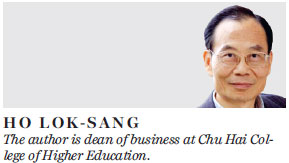Degree places exceed demand - no need for outsider quotas
Updated: 2017-07-25 07:39
By Ho Lok-sang(HK Edition)
|
|||||||
Hong Kong now has a greater supply of first-year first-degree program places than candidates qualified for admission into such programs. There are roughly 15,000 University Grants Committee-funded places. On top of these the Open University of Hong Kong offers 1,455 places, which are included in the Joint University Programmes Admissions System (JUPAS). Non-JUPAS first-year degree places amount to 7,751. All in all, there are 24,198 first-year first-degree places but 20,801 candidates meet minimum admission requirements. These are students whose Diploma of Secondary Education grades are at or better than "33222".
It should be noted that the degree programs of the non-UGC-funded institutions have all been accredited by the Hong Kong Council for Accreditation of Academic and Vocational Qualifications. The accreditation process is rigorous, requiring all programs assessed to be not only academically sound, but taught by qualified staff, and subject to credible quality assurance processes before they bear the "accredited" label.

Legislative Councilor and Executive Council member Regina Ip, in a recent commentary on self-funded degree programs, cast doubt on the quality of these programs, remarking that UGC-funded university places cost taxpayers HK$250,000 a year, considerably higher than the HK$70,000 self-funded degree programs cost. These figures are about right but it should be noted that UGC-funded universities do not just teach. All professors in UGC-funded institutions are required to publish in leading journals and other reputable outlets. Often these publications may not have much to do with the undergraduate teaching which is the bread and butter of undergraduate degrees. I am not downplaying the importance of this research work. But the research duties of faculty in UGC-funded universities mean professors at UGC-funded institutions have rather light teaching loads. The fact that degrees in self-financed institutions cost so much less is largely because teaching staff in these institutions have much heavier teaching loads and much lighter research duties. It is true that most of the teaching staff in these fully recognized private institutions may not be able to obtain or keep faculty positions in the public universities but the reason is typically because they cannot publish as impressively as those who can, and not because they do not teach well. For example, I know of a faculty member who has decent SSCI journal publications and had a teaching excellence award in a public university but still failed to have his contract renewed.
Thus, even if these programs fail to attract sufficient numbers of qualified students the reason has nothing to do with the quality of the programs. There are just too few qualified students. The expansion of private institutions and shrinkage in student numbers mean most of these institutions are under considerable pressure in attracting enough students to make all the programs offered viable, even though over the longer term things may look very different when student numbers rise again.
This then begs the question why should the special administrative region government maintain a quota on the number of students coming from outside Hong Kong. One argument is that even though the SAR government does not offer the private institutions the block grants to maintain their operations, it still had provided land grants. But as long as admission of overseas students is not at the expense of qualified local students, these quotas really do not make much sense. Admitting overseas students benefits local students in at least three ways. First, they may make otherwise not viable programs viable, so local students can have the choice of these programs. Second, they make otherwise not viable courses viable, so that local students can have a greater variety of courses to choose from within each program. Third, a more international atmosphere is a plus to the learning environment. Local students can interact with students from other backgrounds and learn from them. Fourth, having more overseas students will enhance the standing of the private institutions, adding credibility to the degree programs in which local students enroll.
For these reasons, I would strongly advise that the SAR government do away with the quotas and instead just maintain the requirement that private institutions must not reject a local student who meets minimum admission requirements in favor of an overseas student. This requirement is totally sufficient to protect admission opportunities of local student. Removal of the quotas will also help promote the Belt and Road Initiative and will complement the Belt and Road scholarship program that already has been announced.
It is encouraging to learn of the government's proposal to offer subsidies to local students to the tune of HK$30,000 when they are enrolled in degree programs run by private institutions. If the government goes one more step and abolishes the quotas for overseas students our local students will definitely benefit much more, and without adding any cost to the government.
(HK Edition 07/25/2017 page8)